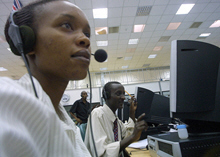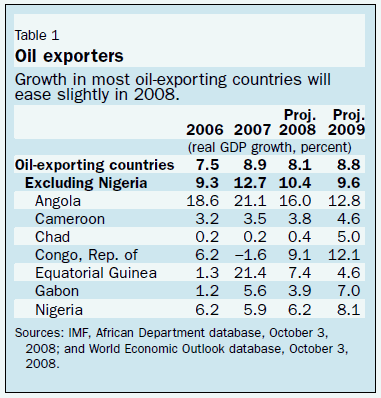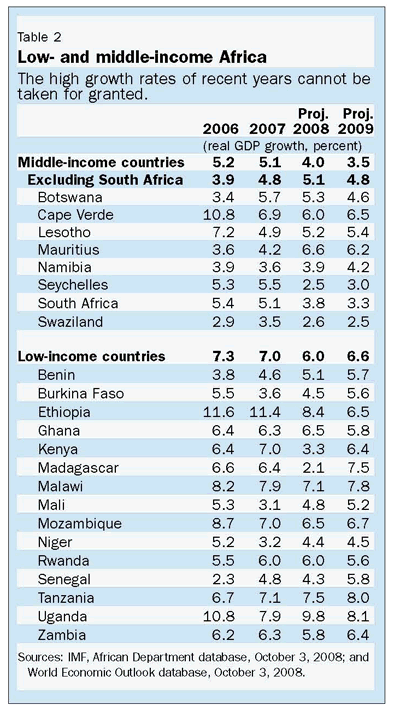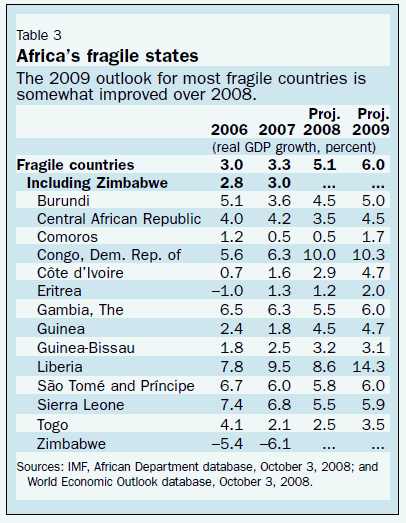
Typical street scene in Santa Ana, El Salvador. (Photo: iStock)
IMF Survey: African Growth Eases as Region Responds to Price Shocks
October 10, 2008
- IMF lowers growth projections, but inflation is markedly higher
- Food, fuel price shocks could lead to increase in poverty rates
- Risks for Africa have increased significantly with uncertain global outlook
Growth in sub-Saharan Africa is projected to ease, reflecting increases in food and fuel prices, slower world growth, and global financial turmoil, according to the IMF's latest regional forecast.

Call center in Nairobi, Kenya: Recent heightened turbulence raises risk of decline in resource flows to Africa (photo: Tony Karumba/AFP/Getty)
REGIONAL ECONOMIC OUTLOOK
The continent's growth is projected to slow slightly to about 6 percent in 2008 and 2009, down from 6½ percent in 2007, while inflation is set to rise to an average 12 percent, says the IMF's Regional Economic Outlook for Sub-Saharan Africa (REO), released today.
So far, the report notes, the main effects of the global financial turmoil appear to be indirect, in the form of slower global growth and volatile commodity prices. But recent heightened turbulence raises the risk of a decline in resource flows to Africa in the form of private capital, remittances, and aid.
"The resilience of growth and macroeconomic stability in the continent is being put to a test," Antoinette Sayeh, Director of the IMF's African Department told the press. "Countries need—more than ever—to be able to respond quickly to unexpected exogenous shocks. In these circumstances, maintaining, if not increasing, aid remains of paramount importance."
Growth prospects
Although GDP growth has tapered off somewhat in sub-Saharan African countries, at slightly less than 6 percent, the growth rate for 2008 is still expected to be relatively strong, continuing the healthy growth trend of previous years.
In oil exporters, growth is expected to fall temporarily by half a percentage point, to 8 percent in 2008, reflecting mainly lower-than-expected oil output in the Niger Delta due to recurring violence there; slightly lower-than-expected production in Equatorial Guinea's maturing main oil field; and weaker non-oil growth in Chad. In oil importers, growth is also projected to decelerate, by half a percentage point, to 5 percent.

In 2009, the REO says, overall growth in sub-Saharan Africa is expected to remain above 6 percent.
Price shocks
But the food and fuel price shock has put upward pressure on inflation and current account deficits. The increase in inflation cuts across countries with different exchange rate regimes and different economic structures and levels of development. Overall, sub-Saharan Africa's inflation in 2008 is projected to climb to 12 percent—a noticeably larger increase than in advanced countries.
Despite recent price declines, food and fuel prices are projected to remain substantially above their 2007 levels. As a result, and although some sub-Saharan African countries have benefited from rising prices on their exports of non-oil commodities (such as aluminum, cotton, and gold), most African oil-importing countries are expected to see a significant and lasting decline in their terms of trade relative to 2007.

Reflecting a substantial oil revenue windfall, fiscal surpluses (excluding grants) in oil exporters are projected to rise to 7 percent of GDP in 2008. Oil importers' fiscal balances, on the other hand, are deteriorating because of lower GDP growth and the cost of policy measures to cushion the impact of the food and fuel price shock. Perhaps surprisingly, grant inflows to oil-importing countries have responded little to the food and fuel price shock.
Poverty concerns
The most pressing challenge for policymakers is to adjust to the food and fuel price shock, preserve macroeconomic stability, and shield the poor.
Food and fuel price increases could lead to a substantial increase in poverty rates in a number of countries. In 2008, through July, world market prices for rice rose by 111 percent, those for wheat 89 percent, and those for maize 48 percent, and world market prices for fuel products rose by 64-82 percent, before easing recently. The impact on poverty of the food price increases could be particularly large in sub-Saharan Africa, given that average households there spend about half of their income on food.
The fuel price increases are likely to have a smaller direct impact on poverty than the food price increases because households in sub-Saharan Africa typically spend less than one-tenth of their income on fuel products. Nevertheless, the ultimate effect of the fuel price increases on poverty rates is likely to be substantially greater than the direct effect, because fuel is an intermediate input into most other goods.
Risks
Risks to the outlook for 2009 from the global environment have increased and are tilted to the downside. One important risk is that the global financial market turbulence could slow global growth by more or for longer than expected, which would likely reduce demand for Africa's exports and depress its terms of trade. In a more-pronounced global downturn, foreign direct investment, portfolio aid, and remittances inflows could slow as well.

To sustain growth and keep inflation in check, countries need to be prepared to respond to sudden changes in global economic conditions, particularly in commodity prices. They may also need to consider building over time an additional cushion in external reserves to better withstand exogenous shocks.
In addition to risks stemming from unforeseen developments in the global environment, there are domestic risks. The main domestic risk is that policies could fail to preserve the growth and reform momentum of recent years, either by not providing enough cushioning for the poor or by failing to preserve sufficient macroeconomic stability. This risk appears particularly acute in several hard-hit low-income oil importers, but other countries do not seem immune.
Comments on this article should be sent to imfsurvey@imf.org


